Related Research Articles
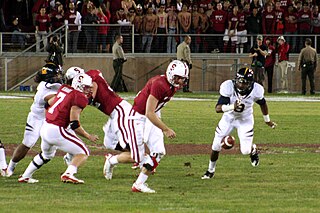
A fumble in gridiron football occurs when a player who has possession and control of the ball loses it before being downed (tackled), scoring, or going out of bounds. By rule, it is any act other than passing, kicking, punting, or successful handing that results in loss of ball possession by a player.

In ball-playing competitive team sports, an interception or pick is a move by a player involving a pass of the ball—whether by foot or hand, depending on the rules of the sport—in which the ball is intended for a player of the same team but caught by a player of the team on defense, who thereby usually gains possession of the ball for their team. It is commonly seen in football, including American and Canadian football, as well as association football, rugby league, rugby union, Australian rules football and Gaelic football, as well as any sport by which a loose object is passed between players toward a goal. In basketball, a pick is called a steal.
The Statue of Liberty is a trick play in American football named after the Statue of Liberty.
The National Football League playoffs for the 2005 season began on January 7, 2006. The postseason tournament concluded with the Pittsburgh Steelers defeating the Seattle Seahawks in Super Bowl XL, 21–10, on February 5, at Ford Field in Detroit, Michigan.

The 1999 NFL season was the 80th regular season of the National Football League. The Cleveland Browns returned to the field for the first time since the 1995 season, while the Tennessee Oilers changed their name to "Tennessee Titans," with the league retiring the name "Oilers."
The 1991 NFL season was the 72nd regular season of the National Football League. It was the final season for coach Chuck Noll. The season ended with Super Bowl XXVI when the Washington Redskins defeated the Buffalo Bills, 37–24, at the Metrodome in Minnesota. This was the second of four consecutive Super Bowl losses for Buffalo.
Walt Coleman III is a former American football official who officiated in the National Football League (NFL) from the 1989 season until the end of the 2018 season. He wore uniform number 65. During his final season in 2018, Coleman was the NFL's longest current tenured referee.
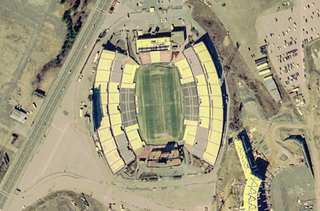
The 2001 AFC Divisional Playoff game between the New England Patriots and the Oakland Raiders, also known as the Tuck Rule Game or the Snow Bowl, or sometimes referred to as Snow Bowl 2, took place on January 19, 2002, at Foxboro Stadium in Foxborough, Massachusetts, which was at the time the Patriot's home stadium. The game, played under a heavy snowfall, was the last at Foxboro Stadium.
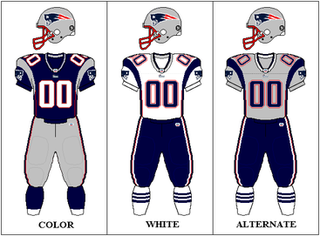
The 2007 season was the New England Patriots' 38th in the National Football League (NFL), their 48th overall and their eighth under head coach Bill Belichick. The Patriots improved on their 12–4 record from 2006 and won the AFC East for the sixth time in seven years by winning all 16 of their games. Starting quarterback Tom Brady won his first NFL MVP award, throwing a then-record 50 passing touchdowns. Newly acquired All-Pro wide receiver Randy Moss joined the Patriots in a trade, after a lackluster couple of years with the Oakland Raiders, and caught a NFL-record 23 receiving touchdowns.
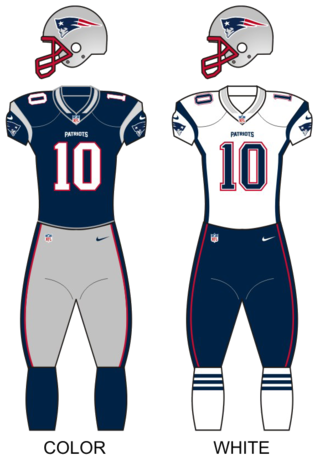
The 2001 season was the New England Patriots' 32nd in the National Football League (NFL) and their 42nd season overall. They finished with an 11–5 record and a division title before advancing to and winning Super Bowl XXXVI.
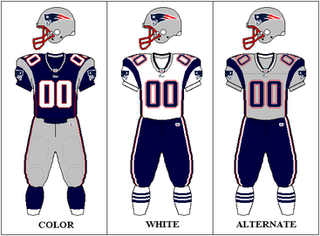
The 2005 season was the New England Patriots' 36th in the National Football League (NFL), their 46th overall and their sixth under head coach Bill Belichick. With a Week 6 loss to the Denver Broncos, the Patriots failed to either improve or match their 14–2 record from last season, finishing with a 10–6 record and the division title before losing in the playoffs to the Broncos, ending their hopes of becoming the first NFL team to three peat in the Super Bowl.
NFL Classics is a series of videotaped rebroadcasts of National Football League games that air on the NFL Network. The show airs weekly during the offseason and also occasionally during the NFL season. As of the 2010, the series airs on Monday night while Super Bowl Classics airs on Friday night.
The 2001 Oakland Raiders season was the franchise's 32nd season in the National Football League (NFL), the 42nd overall, their seventh season since their move back to Oakland, and the fourth year under head coach Jon Gruden, the last of his first stint as the team's head coach.

The 2009 season was the New England Patriots' 40th in the National Football League (NFL), their 50th overall and their 10th under head coach Bill Belichick. They finished with a 10–6 record and a division title before losing to the Baltimore Ravens in the playoffs.

The 2011 season was the New England Patriots' 42nd in the National Football League (NFL) and their 52nd overall. The Patriots finished the regular season at 13–3, and represented the AFC in Super Bowl XLVI. It was the seventh Super Bowl trip in franchise history, and the fifth for head coach Bill Belichick and quarterback Tom Brady.
In gridiron football, a safety is scored when the ball becomes dead behind the goal line of the team in possession of the ball. In most instances, a safety is scored by the defensive team when the ball-carrier of the team in possession of the ball retreats into his own end zone and is tackled or steps out of play from the end zone. A safety can also occur when the offensive team loses control of the ball and it goes out of play from the end zone. Due to their uncommon nature, there are a number of records relating to safeties.

The 2013 season was the Denver Broncos' 44th in the National Football League (NFL) and their 54th overall. It also marked their 30th season under the ownership of Pat Bowlen, the second with Peyton Manning as the team's starting quarterback and the third under head coach John Fox.

The Butt Fumble was a notorious American football play from a National Football League (NFL) game played on Thanksgiving Day, November 22, 2012, between the New York Jets and New England Patriots.
The National Football League playoffs for the 2015 season began on January 9, 2016. The postseason tournament concluded with Super Bowl 50, on February 7, when the Denver Broncos defeated the Carolina Panthers at Levi's Stadium in Santa Clara, California.

The 2016 season was the New England Patriots' 47th in the National Football League (NFL), their 57th overall and their 17th under head coach Bill Belichick.
References
- 1 2 3 4 5 6 7 8 Maske, Mark (October 15, 2005). "Tuck Rule Hard to Grasp". The Washington Post . Retrieved 2012-01-14.
- 1 2 Manza Young, Shalise (March 20, 2013). "NFL rescinds 'tuck rule'". Boston Globe. Boston Globe Media Partners, LLC.
- ↑ "New York Jets at New England Patriots – September 23rd, 2001". Pro-Football-Reference.com.
- ↑ ESPN footage. Archived from the original on 2012-09-06 – via YouTube.[ dead link ]
- ↑ "Crookdnose's Favorite Football Memory: The Snow Bowl". foxsports.com. 2006-01-18. Archived from the original on 7 Sep 2006. Retrieved 2006-07-19.
- ↑ Monkovic, Toni (2011-01-11). ""Mike Pereira No Longer Supports Tuck Rule"". The New York Times. Retrieved 2011-01-11.
- ↑ Bell, Jarrett (March 14, 2013). "Bell: NFL Can Finally Tuck Away Horrible Rule". USA Today. Retrieved 2013-03-14.
- ↑ Hensley, Jamison (March 20, 2013). "2013 NFL Rules Changes". ESPN NFL Nation Blog. Retrieved 2013-03-20– via espn.go.com.
- ↑ "2016 Official Playing Rules of the National Football League" (PDF). NFL.com. National Football League. Retrieved 2019-01-28.